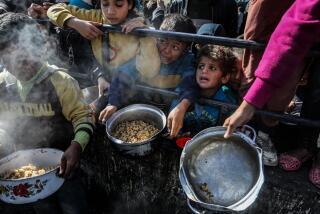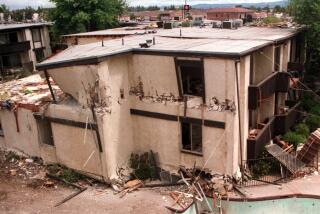Despair of Fruitless Rescue Effort Lingers
Dr. Greg Palmer had spent more than seven years training in urban search and rescue operations so that he would be ready to rush into a collapsed structure and rescue survivors.
As a member of one of eight California urban search and rescue teams formed after the 1994 Northridge earthquake, Palmer kept a duffel bag packed with survival gear ready even though he had never been activated--until Sept. 11, 2001.
On that day, as the nation absorbed the shock of terrorist attacks on the World Trade Center and the Pentagon, Palmer left for New York City for an 11-day deployment.
“It came as a surprise that the time we were called up, after seven years, turned out to be such a large-scale incident,” Palmer said, sitting in his office at Northridge Hospital and Medical Center’s Sherman Way Campus in Van Nuys.
As medical manager of the Los Angeles Fire Department’s 56-member urban search and rescue team, Palmer was in New York to supervise two physicians and help other team members looking for survivors.
Only now, nearly one year after two hijacked jetliners slammed into the World Trade Center towers, has Palmer begun to come to grips with his anger, sense of loss and renewed appreciation for life--feelings he had to push aside as he combed through tons of debris in the days immediately following the attack.
“I was so focused on the assignment at the time,” Palmer said. “I wasn’t able to focus on the big picture.”
Palmer said he is still saddened by the loss of innocent life and by the fact that his team did not find any survivors in the rubble of the collapsed skyscrapers.
Team members pulled six bodies from the twisted steel and concrete in their first two days of searching, Palmer said, but their hopes faded as time went on.
“To know that there were so many people missing; to see the displays put up on fences by families looking for their loved ones, and not to have found one person alive was very disheartening,” he said. “Emergency rooms were ready for a deluge of people that never came.”
Capt. Mike Jacalone, who heads the 56-member Los Angeles City Fire Department urban search and rescue team of which Palmer is a member, said many rescue workers still are troubled that no one was found alive.
“It was a successful deployment,” said Jacalone, “but it’s hard to call it successful when there were no survivors to recover. It weighs heavy on our hearts and minds.”
Powerful memories of standing among the devastation at ground zero on the night following the attack still surface in Palmer’s thoughts. “I was overwhelmed by the size of the site. It seemed almost surreal because of all the floodlights.”
As an emergency room physician, Palmer has seen his share of disfiguring injuries, but he was not prepared for what he saw at the towers’ collapse site.
“There was only rubble and powder,” he said. “There was only minimal evidence of humans in that rubble. No one could have realized that the force of the fire and collapse would have pulverized everything.”
Palmer’s initial feelings of shock and grief have given way to simmering anger.
“I’ve gotten more angry about the attack on us,” he said. “I feel especially bad because of the innocence of the people who were total noncombatants.”
The humble Arcadia physician with a gracious manner and a dry sense of humor, however, has not allowed himself to become bitter in the last year. Instead, he said he has come to value life and his family even more.
“We don’t appreciate what we have until something horrific like this happens,” he said. “There isn’t a day that I leave for work anymore that I don’t kiss my wife goodbye and tell her that I love her.”
Palmer said he doesn’t have any special plans to mark the anniversary. Instead, he intends to spend a quiet day with his wife, Suzanne.
“I know that anniversaries are significant to terrorist groups,” Palmer said, referring to the Oklahoma bombing that occurred on the second anniversary of the fire at the Branch Davidian compound near Waco, Texas. “I hope it will be a very quiet Sept. 11 for all of us.”
Although Palmer’s unit has not been called up since the attack, the physician continues to train in urban search and rescue operations and confined space medicine.
“Palmer is very committed to the team,” Jacalone said. “He makes himself available for nearly every training.”
Palmer hopes that he will never have to put his training to use again, but he is prepared to go if called upon.
“I’ll never forget how privileged I was to go and participate in something that was so historic and so monumental to the country,” he said.
More to Read
Sign up for Essential California
The most important California stories and recommendations in your inbox every morning.
You may occasionally receive promotional content from the Los Angeles Times.










